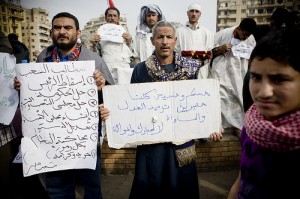What Can We Do to Support Egypt?
Address in Solidarity with the Popular Revolution
by John Clark
We have all been moved by the courageous actions of the Egyptian people in recent weeks. In response to their inspiring example, we might ask the following question: What effective steps can we take to support their struggle for liberation,  and to support similar struggles throughout the world?
and to support similar struggles throughout the world?
There is a very easy, and very bad, response to this question. Unfortunately, it is also the one that is most popular. This response is to express our great sympathy and admiration for their struggle, and then to go on acting as we have in the past. I propose that a more constructive response would be, first, Â to become better educated about what has made their struggle necessary, and, next, Â to begin to act in ways that that will make it, and similar struggles, more likely to succeed in the future.
If we look at the actions and statements of the U.S. regime over the past days, we see the strategies of a system that has long supported dictatorship and oppression and now finds itself in an embarrassing situation. Its heart and soul are on the side of dictatorship, but its words must now be on the side of the people. It finds itself in the unenviable position of trying desperately to manipulate a difficult situation so that the interests it defends will not be compromised by the catastrophe at hand — the catastrophe of democracy breaking out.
Let’s look at some of the recent statements of our rulers.
Last week, Vice President Biden said, “I hope [that] President Mubarak … is going to respond to some of the legitimate concerns that are being raised. Mubarak has been an ally of ours in a number of things and he’s been very responsible … relative to geopolitical interests in the region…. I would not refer to him as a dictator.†Thus, as late as just over a week ago, it was still acceptable to express friendship with the dictator and to hope that a few gradual reforms would appease the Egyptian people. The following day, the senator and former Democratic presidential nominee John Kerry could still call Mubarak “a friend to the United States and a friend personally.†And on the heels of this, U.S. envoy Frank Wisner could still say, “I believe that President Mubarak’s continued leadership is crucial — it’s his chance to write his own legacy.”
Soon after, however, in the face of growing mobilization by the Egyptian people, it became clear that at least some degree of significant change was necessary, so that the emerging official goal would be the containment and direction of that change to whatever degree possible. President Obama had reached the point of advising Mubarak that there must be “an orderly transition,†though a transition to precisely what was not at all clear. We were told only that “it must be meaningful, it must be peaceful, and it must begin now.â€
What Obama did not, of course, mention as he pronounced these pious sentiments, was that what U.S. regimes have supported for thirty years — up to just a few days ago, when such a policy became impossible — has been the precise opposite of what he now espouses verbally. These regimes have supported not peaceful change but rather the violent enforcement of a disastrous status quo. The many billions of dollars that the U.S. government has sent to Mubarak — which is now widely known to be $1.5 billion per year — have been primarily in military aid to keep his violent, repressive regime in power. And contrary to any ideological illusions, intimidating a people into submission through force and the threat of force is not a “peaceful†process.
As of today, the Obama administration has reached the point of expressing its support for a gradual transition of some sort under the tutelage of the dictator’s handpicked vice president, Gen. Omar Suleiman. As Secretary of State Hillary Clinton explained regarding this necessary transition, “That takes some time. There are certain things that have to be done in order to prepare.†She did not define “certain things.†However, we can safely assume that these “things†include finding ways of assuring that a form of “democracy†emerges that has safeguards against the will of the people diverging too radically from the will of the dominant global powers.
Secretary Clinton refused to address the question of how the necessary preparations for “democracy†relate to the question of Israel and Palestine. However, her ally, Mr. Davutoglu of Turkey commented, “It is better not to talk about Israel-Palestine now. It is better to separate these issues.†It is, however, quite obviously impossible to separate these issues. Thus, the question posed is how to read this statement in support of the impossible. The obvious reading is the following. What is “better†is that the public and the press should not inquire into how the dominant forces are planning to engineer a solution to the crisis that is compatible with the goals of the U.S. and Israeli regimes and of various allied interests, whatever the views and aspirations of the Egyptian people may be.
There are many other intriguing statements by our rulers that might be analyzed — including Senator John McCain’s comparison of the movements against authoritarian regimes in the region to a “virus†that is “spreading throughout the Middle East” — but I hope that the point has been made. All of this recent history must be understood in its larger context, which includes a long history of U.S. government support for dictatorships around the world. We might refer merely to such notable examples as Francisco Franco, Ferdinand Marcos, and Suharto — one of the greatest mass-murderers of the horrifyingly genocidal 20th century. This support continues, as dictatorial conditions persist among U.S. allies including Cameroon, Turkmenistan, Equatorial Guinea, Chad, Uzbekistan, Ethiopia, and Saudi Arabia (as recently documented by Joshua Holland for AlterNet).
The conclusion we must draw from this long and consistent record is that U.S. support for dictatorships is not a historical anomaly, but rather points to something systemic about the U.S. political and economic structures. If we sympathize with the liberation struggle of the Egyptian people and others around the world, it is incumbent on us to find out what that  something is and to do something about it.
something is and to do something about it.
So what we can do? First, we might ask who we are. As I use the term here, “we†are those who believe that it is completely intolerable to live in a world of material abundance in which a billion people nevertheless live in absolute poverty. “We†are those who believe that it is intolerable to live in a world with abundant potential for freedom, justice and peace, while that same world is fraught with oppression, exploitation, and aggression. “We†are those who believe that it is intolerable to live in a world capable of providing for all while living in harmony with nature, but which nevertheless continues on a path to global ecological catastrophe.
What we can do is to become educated and to act. It is important that we find dependable sources of information and that we avoid dependable sources of indoctrination. Look to the alternatives to the dominant corporate media. As we come to understand the dominant political system, we begin to see how it is designed precisely to reproduce all those injustices and irrationalities that have been mentioned. More specifically, we begin to see how it is designed to support dictatorship and oppose struggles for liberation.
Our own ruling party is quite brilliant in that, unlike that of Egypt, it has two branches. One, called the Republicans, takes the initiative in developing the trajectory of the system. It experiments with how far the limits of that system can be pushed. When this development causes too much disorder and opposition, the other branch, called the Democrats, steps in, introduces measures to restabilize the system, diffuses dissent, and then, before long, turns power back over to Republicans.
Repeatedly, we hear well-intentioned people say, “I can’t believe that Obama has done X.†“I can’t believe that Obama has escalated the war.†“I can’t believe that Obama supports dictators.†Et cetera, ad infinitum. There is a solution to this perplexing condition. Grow up and believe it. President Obama does exactly what he has been hired to do.
Understanding presupposes that one can finally step outside the system of domination. It means that one has become conscious of the ways in which that system has colonized not only the whole world, but also our own minds. When one understands, one can then move on to action, and will indeed feel a powerful need to act.
So what does it mean to act? To act means to organize to create another world. A world in which people will laugh when told that the way to defend “democracy†is to support dictators. A world in which people will laugh when told that a regime that refuses the majority of its people the elemental right to return to their homeland is a “democratic†regime. It means that after laughing, we will find a way out of these tragic absurdities. It means that we will find the courage to stand in the way of the genocidal, ecocidal machine, that we will finally learn how to become a collective force that blocks its advance, and that ultimately, we will change the course of history.
Today, we might say that it means not only supporting the brave people of Egypt, but following their noble example and doing the same thing here … and everywhere.
John Clark, Ph.D., is the Gregory F. Curtin Distinguished Professor in Humane Letters and the Professions and Professor of Philosophy at Loyola University New Orleans. Among his many books are The Anarchist Moment (Black Rose, 1984), Environmental Philosophy (Prentice Hall, 2004), and the forthcoming Aborder l’impossible (Taking on the Impossible). This statement was originally delivered as an address for a rally held at the Hale Boggs Federal Building in New Orleans, on the International Day of Mobilization in Solidarity with the Egyptian and Tunisian Revolutions, February 5, 2011.

What Can We Do to Support Egypt? http://t.co/HIrTLPX
1hi just saw this today on commondreams too! http://www.commondreams.org/view/2011/02/07-5
2http://t.co/JG2Wczo article assumes #USA holier-than-thou. BS! What can we do? The same thing here! #Egypt pulling ahead on freedom scale. â’¶
3John’s article is also on Revista Amauta: http://revista-amauta.org/2011/02/what-can-we-do-to-support-egypt/
4And on Truthout too! http://www.truth-out.org/what-can-we-do-support-egypt-address-solidarity-with-popular-revolution67549
5